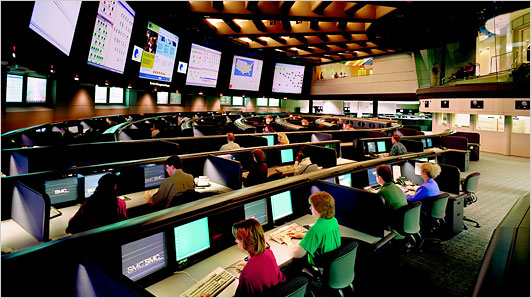Perched near the Arctic Circle, the Swedish town of Luleaa hopes that a massive data centre for US social networking giant Facebook will launch the vibrant industrial region into the digital age as a European data traffic hub.
“The digital industry will be an important addition to our town,” Mayor Karl Petersen told AFP.
With a population of 74,000, Luleaa has long been home to Sweden’s thriving steel industry, with one of the world’s leading producers, SSAB, based there. It is also a key hub for the mining and pulp and paper sectors.
In October, Facebook announced it had chosen the Swedish town for its first European data centre, and third globally, in large part because of its “suitable climate for environmental cooling (and) clean power resources.”
The icy region, located on the same latitude as Fairbanks, Alaska, was especially attractive due to its climate, “since cooling (computer) servers is a major issue for data centres,” Facebook said.
The company is expected to pump between three and five billion kronor (326-543 million euros, $440-734 million) into the data centre, creating 300 new construction jobs for the next few years and then 50 to 60 permanent jobs, Petersen said.
“This is the biggest single investment in Luleaa since the steel plant was built in 1940,” he added.
He hopes the data centre will put Luleaa on the map, attracting other businesses to the region dubbed the “Node Pole.”
“Talks are already underway” with a few companies, he said.
“Facebook is one of the world’s biggest brand names … Awareness about the town of Luleaa will increase and that means a lot.
“We have a very modern steel industry, we’re a very industrial town and we have the Luleaa University of Technology. So we have a lot of competence and research here,” Petersen said.
In Sweden’s sparsely-populated far north, “we’re a big town with a lot to offer and a varied labour market … Our local economy is doing well, we have a strong birth rate and new people moving here all the time,” Petersen said.
One of the main reasons Facebook selected Luleaa was that the data centre could run primarily on renewable hydropower.
The Lule river that runs through the town supplies Sweden with nine percent of its electricity and has proved a stable energy source for the town’s industries for decades.
The data centre will consist of three server buildings each covering an area of around 28,000 square metres (300,000 square feet).
The first building is already under construction and is expected to open for business in mid-2013.
